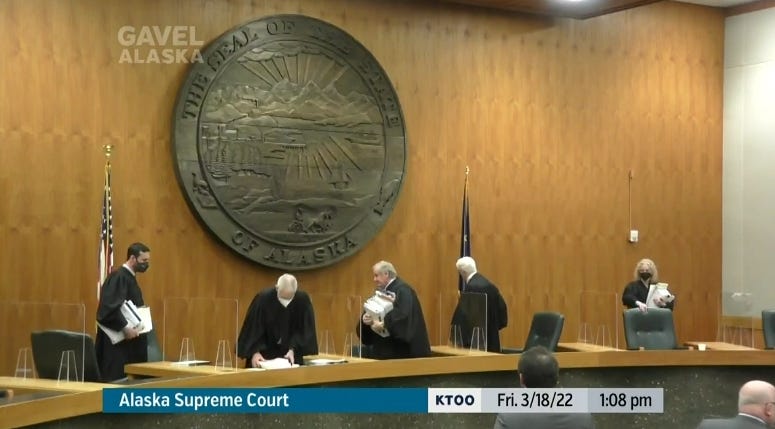Supreme Court to hear appeal in Armstrong residency case/Senate majority announces priorities, hints at retirement system changes
In briefings provided to the Alaska Supreme Court, Vazquez’s attorney Stacey Stone argues that the ruling was made in “complete defiance” of the case law on residency in Alaska.
It’s Thursday, Alaska!
In this edition: The Alaska Supreme Court is set to hear the appeal on Friday in the case challenging Anchorage Rep.-elect Jennie Armstrong’s residency. Let’s break down the basics of the appeal, which comes just days before the Alaska Legislature is set to convene in Juneau for the 33rd legislative session. Meanwhile the House is still unorganized, but that hasn’t stopped the Senate bipartisan super-majority from pushing ahead with staking out its policy positions, which includes potentially massive changes to how the state’s public employee retirement system—a major source of woe when it comes to recruitment and retention in just about every field—works.
Coming soon: Dispatches from the Alaska Supreme Court.
Correction: Amy Demboski was city manager under Dave Bronson, not chief of staff.
Alaska Supreme Court to hear appeal in Armstrong residency case this Friday
With the Alaska Legislature set to convene next Tuesday, the Alaska Supreme Court will be hearing an appeal in a case challenging the qualifications of a Democratic representative-elect.
On Monday, Superior Court Judge Herman Walker delivered a ruling that found Anchorage Rep.-elect Jennie Armstrong became a resident in the early morning of May 20, 2019 and therefore just barely met the state’s requirement that candidates be an Alaska resident for three years prior to filing. The plaintiffs in the case, Republican former representative-turned-perennial candidate Liz Vazquez and her supporters, have since appealed the case to the Alaska Supreme Court, arguing Judge Walker got it wrong.
The complaints originated from claims circulated by the Alaska Landmine website, which argued that based on social media postings and applications for a fishing license and voter registration. They argue that they prove Armstrong became a resident after the June 1, 2019 deadline to establish her residency in time for the 2022 election.
But Judge Walker disagreed.
Following a trial that put Armstrong’s relationship with her husband, Ben Kellie, under the microscope, Judge Walker ruled that Armstrong became a resident on May 20, 2019 when at the end of a romantic trip to visit Kellie in Alaska she decided she would stay and make a life in the state. Relying on case law about residency in Alaska and Montana, Walker ruled that intent is a significant factor in deciding whether someone is a resident of Alaska.
“Case law authorizes the court to consider the emotional and physical connection to one’s residence. Armstrong made an emotional decision to make Alaska her home—she fell in love,” wrote Judge Walker. “Both Armstrong and Kellie testified that their relationship became ‘romantic’ prior to her arrival in May based on their initial meeting on the video call. Armstrong further testified that after traveling the world and living ‘location independent,’ she was attracted to Alaska by Kellie’s two power point presentations showcasing Alaska. Armstrong made the decision to ‘go all in,’ and move to Alaska because she was in love.”
Armstrong then left Alaska to collect her belongings and returned in early June. Vazquez’s legal team argues that the initial trip where Armstrong committed to moving to Alaska was merely a vacation and her residency should have only started once she actually moved her things to Alaska, which would put the start of her residency after the filing deadline.
Judge Walker also disagreed on that point.
“Armstrong came to Alaska and fell in love with her husband Kellie. Armstrong testified that her intent to move here was made in the early morning hours of of May 20, 2019,” Walker wrote. “Once residency is established, a resident may temporarily leave Alaska and maintain their residential status if they intend to return.”
In briefings provided to the Alaska Supreme Court, Vazquez’s attorney Stacey Stone argues that the ruling was made in “complete defiance” of the case law on residency in Alaska.
“The superior court completely failed to weight the objective evidence that Armstrong did not establish residency in Alaska until at least June 8, 2019. Rather, the superior court, in complete defiance of Oberlatz, relied almost exclusively upon Armstrong’s subjective belief that her decision, made on May 19-20, 2019, that she would move to Alaska and cohabitate with Kellie established her residency in the state. Such reliance was erroneous and completely disregarded the mountain of objective evidence to the contrary.”
The Vazquez legal team argues that the only solution is for the Alaska Supreme Court to invalidate Armstrong’s victory, handing the seat to Vazquez despite her finishing a solid 10 percentage points behind Armstrong. Other, more realistic remedies that have been floated in election contests include holding a new election or leaving the vacancy to be filled via appointment and confirmation, which still would lead to a Democrat holding the seat.
In the response brief by Armstrong’s legal team, helmed by Scott Kendall, they argue that the case law before the Alaska Supreme Court does, in fact, give great latitude to the intent of a person in establishing residency. It also sets a high bar for challenging a person’s residency.
“This Court explained that ‘[a] voter’s residency intent is a question of fact determined by the superior court after sifting and weighing evidence,’ and that ‘[t]he burden of [contesting residency] . . . is on the
challenger.” Moreover, this Court held that, ‘[a]bsent any indicia of fraud or unreasonableness or implausibility, the court should accept the statements of the voter as to their intended residence if supported by sufficient indicia of residency,'” the briefing argues. “Indeed, this Court reiterated that ‘even a park bench will be sufficient’ as a location to establish residency, and recognized that leaving personal property at a residence may be evidence to support residency. Vazquez therefore can only succeed if she contests Armstrong’s stated residency date by presenting credible evidence of fraud, unreasonableness, or implausibility. She did not.”
The Alaska Supreme Court is scheduled to hear oral arguments at 12:30 on Friday. It will be streamed live on Gavel Alaska here. And I’ll have the play-by-play on Twitter.
The Legislature is set to gavel in on Tuesday, but the House has yet to establish a majority.
Senate majority announces priorities, hints at retirement system changes

We’re less than a week away from the start of the 2023 legislative session and the House has still not organized a majority, but that hasn’t stopped the 17-member Senate bipartisan majority from getting down to business.
Today, the majority announced its finalized committee leadership as well as its top legislative priorities for the legislative session: lowering the cost of energy, lowering the cost of health care, providing “adequate” funding for public education “while assessing accountability and performance” and “seeking solutions” for the state’s public employee and teacher recruitment and retention.
While the first three points are fairly standard priorities, the last point is sure to grab some attention.
Keep reading with a 7-day free trial
Subscribe to The Alaska Memo by Matt Buxton to keep reading this post and get 7 days of free access to the full post archives.




